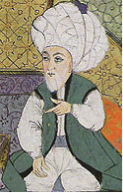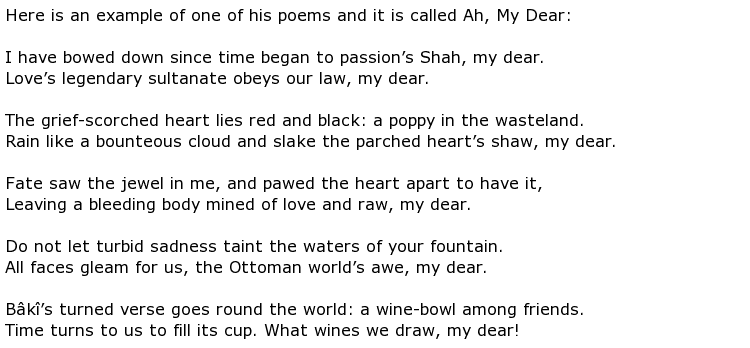 Bâḳî, sometimes referred to as Baqi, was the name used by one of the greatest of the medieval Ottoman Turkish poets who lived during the 16th century. There have been few more significant contributions to literature in Turkey throughout history and, for this reason, he is known as literally the “Sultan of Poets”.
Bâḳî, sometimes referred to as Baqi, was the name used by one of the greatest of the medieval Ottoman Turkish poets who lived during the 16th century. There have been few more significant contributions to literature in Turkey throughout history and, for this reason, he is known as literally the “Sultan of Poets”.
Bâḳî was born Mahmud Abdülbâkî sometime in the year 1526. He was raised by a family with not much to their name in Constantinople. It was his father’s responsibility, as the muezzin at the local Fatih Mosque, to recited and lead the call to prayer for each and every prayer meeting, every day. Bâḳî was put into an apprenticeship by his father to make harnesses but the boy had academic preferences. He would rather go to classes at an Islamic school nearby, known as a medrese. He was a bright and willing pupil and his family recognised that a full time education would benefit him greatly. Many famous teachers of the region gave lessons at his school and he soon developed a great interest in reading poetry, and gradually became a competent writer himself. He took great delight in reading the work of one of the well-established Turkish poets by the name of Zâtî.
It is not recorded what qualifications Bâḳî achieved at school but he learned enough to be employed as an educator for some time after leaving formal education. He continued to write poetry at the same time and he began to become well known far and wide. Perhaps because of his well-known status the Ottoman bureaucracy saw fit to appoint him as an Islamic judge – a kadi – along with a variety of other official appointments.
Bâḳî was closely involved with the Ottoman ruler Süleymân I and enjoyed a great deal of favour within the royal palace environment. This closesnes continued throughout the sovereignties of Selim II and Murad III. His abilities as both poet and court official were clearly appreciated by everyone who knew him. The general public who were able to read his poetry also appreciated his talent. It is said that the ambience created by the Ottoman rulers were influences on his style of poetry. He clearly took great joy in being alive at this time and descriptions of everyday natural events and feelings of love, reminiscent of a Sufi-like concept of love, feature heavily in his poems.

Much Ottoman-era poetry is heavily influenced by Sufi concepts of love but historians have deduced that there is no such influence in Bâḳî’s work even though there are direct similarities. The interesting point about his work though is that there was very little published – he preferred quality over quantity. He famously wrote an affectionate elegy for his good friend, the ruler Süleymân I. It is certainly one of the most revered pieces of Turkish literature.
Bâkî died in Istanbul in the year 1600, aged 74.

